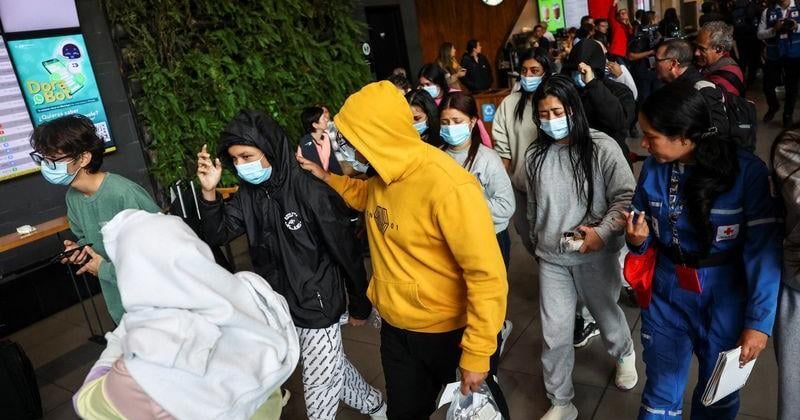
Colombian migrants who were deported from the United States during the initial phase of President Donald Trump’s administration report having faced humiliating treatment, although some express a desire to attempt returning to the U.S.
Daniel Vasquez, 40, anticipated a quick release after being apprehended by U.S. immigration officials while crossing the Mexican border in January. He had paid $500 to a group of human smugglers, known as “coyotes,” who assured him that detentions would last only a few hours.
Contrary to his expectations, Vasquez was held for over a week in immigration facilities located in San Diego, California, and Laredo, Texas, describing his ordeal as a “roller coaster of emotions.”
He recounted that the conditions in San Diego were cramped, with harsh lighting that prevented him from sleeping. After being transferred to Laredo, where he was detained for four days, he was sent back to San Diego before being put on a flight to Colombia, each transfer occurring while he was restrained in chains.
“The sensation of those handcuffs and the overall experience was surreal for me. It was disheartening, shocking, and degrading,” he remarked.
U.S. officials have historically used chains and handcuffs to restrain migrants during transport. However, since Trump assumed office, both the Brazilian and Colombian governments have raised concerns regarding the inhumane treatment of deportees on flights.
Deportees from Brazil reported instances of abuse and being denied bathroom breaks. Vasquez noted that he witnessed women urinating in their seats during his flight.
U.S. Immigration and Customs Enforcement (ICE) did not provide comments regarding the treatment of migrants on flights or the reports of detainees being denied access to restrooms.
Vasquez’s deportation flight to Colombia was among those that Colombian President Gustavo Petro ordered to be turned back, citing the poor treatment experienced by passengers. This decision resulted in a trade dispute with Trump, which was resolved when Bogotá agreed to send its own aircraft to repatriate migrants.
The Brazilian and Indian governments have pledged to work with the U.S. government to make sure migrants are well-treated on deportation flights.
Guatemala’s president has agreed to take deportees of other nationalities, while El Salvador has offered its prison system to the U.S. government.
Jose Vicente Suarez, 58, another Colombian, was also on one of the flights blocked by Petro and was later deported on a different flight.
Suarez began his journey northward last May, making his way through the Darien Gap – a dangerous stretch of jungle in Panama – up through Central America to reach Mexico, where he said fellow migrants experienced robberies, violence and sexual assaults.
The trip cost him some 25 million Colombian pesos (about $6,000) and left him in debt, Suarez said. After more than seven months traveling, he was deported within two weeks of crossing the U.S. border in January.
Suarez also complained of poor treatment in San Diego before being restrained and flown to El Paso, Texas.
“They mistreat you psychologically,” Suarez said, describing being woken up to five times a night and made to sit for up to 90 minutes in a corridor, similar to an experience detailed by Vasquez.
ICE did not respond to questions about allegations of mistreatment in migrant detention centers.
Vasquez said he had no way to let his family know where he was and resorted to scratching relatives’ phone numbers into cardboard raisin packets and handing them to fellow detainees who were due to be released. He later learned that one released migrant made contact with his sister.
Vasquez, who said he had previously entered the U.S. on different visas, is looking to return and working with a lawyer to do so legally, convinced he has better opportunities for work than in Colombia.
Suarez, however, who went for work and to reconnect with his children who live in the U.S., said he has no desire to try his luck again.
“I don’t advise anyone to go,” he said.



